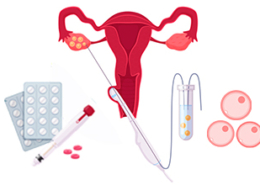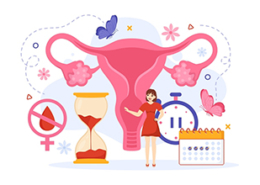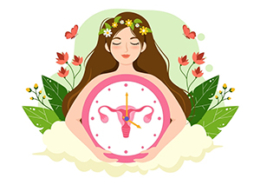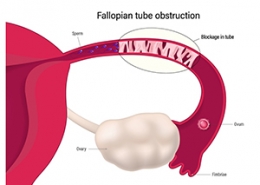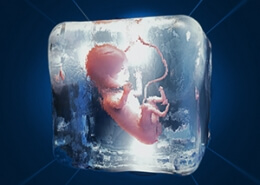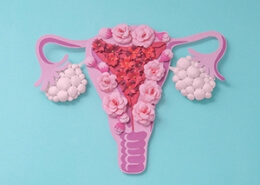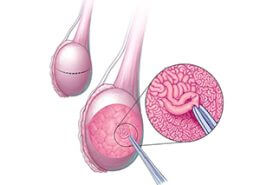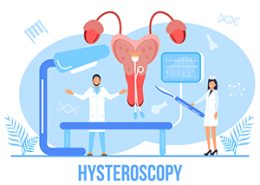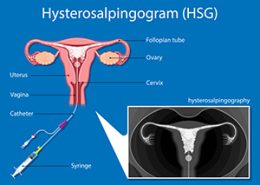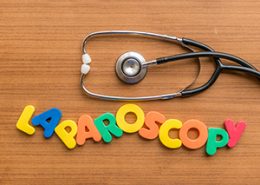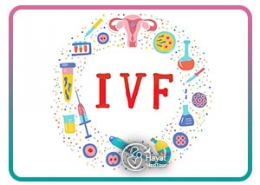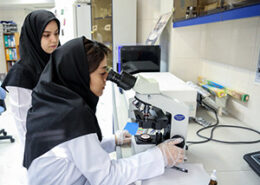Proper foods before pregnancy
Couples usually look for strategies to increase fertility, pregnancy success, and fetal health before trying to conceive. A healthy diet and a balanced weight before pregnancy are among the most important and influential things in the pregnancy process. Consuming healthy and nutritious food before pregnancy can provide minerals and vitamins needed by the body during pregnancy and help the growth and health of the fetus.
Changing the diet and improving the lifestyle before pregnancy is not only necessary for the mother but also equally important for the father.
Balanced weight and proper nutrition before pregnancy can help parents’ health, increase the quality of eggs and sperm, and increase the chances of forming a healthy fetus and a successful pregnancy. (Learn How You Can Boost Your Egg Quality)
Therefore, nutritionists recommend that couples change their lifestyles and modify their diet at least three months before pregnancy in order to have a healthy and successful pregnancy.
If you are planning to get pregnant and are looking for a suitable diet before pregnancy, stay with us in this article.

Pre-pregnancy diet for women
Healthy nutrition is an important part of preparing for pregnancy. Many women do not have a balanced diet before pregnancy and may not be able to meet their needs during pregnancy.
In addition to improving the quality of eggs and providing nutrients needed by the body during pregnancy, a proper diet can also help balance weight before pregnancy. Consuming healthy and nutritious food and having a balanced BMI (weight to height ratio) plays an important role in the mother’s health during pregnancy and helps the proper development of the fetus.
Proper nutrition is not only important before natural pregnancy, but also helps the success of infertility treatments such as IUI, IVF, ICSI, etc. (Read about proper nutrition before IVF: The Best IVF Diet).
Carbohydrates
Carbohydrates make up more than half of the daily diet and are necessary for body activity. But it should be noted, excessive consumption of carbohydrates can cause obesity and reduce fertility. Therefore, determining the appropriate amount of carbohydrates in the pre-pregnancy diet is very important.
Additionally, today, most carbohydrates are available in refined, bran-free form. Refined carbohydrates such as white bread, white flour, white rice, white pasta, etc. lose a large part of the key nutrients found in grains in the refining process.
Among the excluded nutrients are things like antioxidants, B vitamins, and iron that can help boost fertility. Therefore, nutritionists recommend using whole grains such as whole wheat, brown rice, oats, quinoa, whole meal bread, barley, and corn in the pre-pregnancy diet as much as possible.
Women with polycystic ovary syndrome (PCOS) should pay more attention to the consumption of whole grains in their diet. High consumption of refined carbohydrates in people with PCOS increases the amount of insulin in the blood and leads to irregular menstruation.
Therefore, it is better for these women to minimize the consumption of refined carbohydrates and replace them with whole grains before pregnancy.
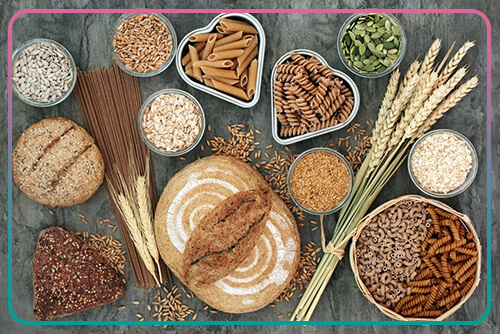
Fruits and vegetables
Fruits and vegetables are natural multivitamins. In addition to vitamins and minerals, this group of foods is rich in antioxidants and phytochemicals. Phytochemicals are compounds found in plants that give them their color, taste, aroma, and other properties.
Phytochemicals and antioxidants in fruits and vegetables fight free radicals in the body and prevent damage to eggs and sperm. Therefore, consuming a few servings of fresh fruits and vegetables in the pre-pregnancy diet can help increase fertility and pregnancy health. Colorful fruits and vegetables such as bell peppers, dark green leafy vegetables, carrots, pumpkins, berries, apricots, red fruits, etc. are preferred because they contain more nutrients.
Dairy
Dairy products are rich in calcium. Calcium strengthens the reproductive system and increases the chance of pregnancy. Therefore, it is recommended that women use 3 servings of milk, yogurt, or cheese daily in their pre-pregnancy diet.
Pasteurized dairy products should be used in the pre-pregnancy diet. Because unpasteurized dairy products can cause diseases that are dangerous for both the health of the mother and the health of the fetus.

Protein
Protein is a very essential part of the diet. Scientific studies show that daily consumption of meat along with vegetable proteins can increase fertility. Therefore, nutritionists advise mothers who plan to become pregnant to use low-fat meat, chicken, fish, legumes, nuts, and oil seeds in their diet.
In addition to the food groups mentioned, it is better for mothers to include the following nutrients in their diet before pregnancy in order to have a healthier pregnancy:
- Folic acid: Women of reproductive age need 400 micrograms of folic acid per day. Folic acid or vitamin B9 is a nutrient that can reduce the risk of birth defects in the nervous system of the fetus. Neural tube defects usually appear in the first month of pregnancy, so it is recommended that mothers start consuming foods and supplements containing folic acid before pregnancy and continue during pregnancy. Folic acid is found in green leafy vegetables, nuts, beans, citrus fruits, liver, whole grains, etc. In most cases, the doctor also prescribes medicinal supplements containing folic acid to ensure the supply of folic acid necessary for the growth of the fetus.
-
Iron: Iron helps the proper development of the fetus during pregnancy. Many women have low iron stores due to monthly periods and a diet low in iron. The body is not able to produce iron, but it can receive and store iron from food sources.
Therefore, women before pregnancy should have a varied diet rich in iron so that they can store the iron needed during pregnancy. Red meat, egg yolk, liver, fish, legumes, whole grains, dark chocolate, etc. are rich in iron. For better absorption of iron, it is recommended to eat foods containing iron together with sources rich in vitamin C such as citrus fruits. If the required iron is not provided by a proper diet, the doctor prescribes supplements containing iron.
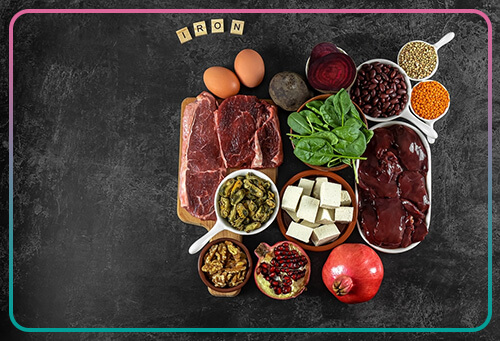
-
Iodine: Iodine deficiency can cause thyroid disease. The body needs 150 micrograms of iodine per day. Meanwhile, the need for iodine in pregnant women reaches 250 micrograms per day. Iodine plays a very important role in the proper functioning of the brain during pregnancy.
If there is not enough iodine in the body, the child’s brain and mental function will not develop well. Therefore, attention should be paid to iodine consumption in the pre-pregnancy diet. Seafood such as shrimp and fish, dairy products, baked potatoes, and eggs are rich sources of iodine. In addition, it is recommended that women use iodized salt in their diet before pregnancy.
- Calcium: Sufficient storage of calcium in the mother’s body can guarantee the health of the child’s teeth and bone growth in the future. If the calcium reserves of the mother’s body are low during pregnancy, the body supplies calcium necessary for the growth of the fetus from the mother’s bones, which may increase the risk of osteoporosis in the future. Calcium is found in dairy products, lentils, beans, almonds, sesame, spinach, and cabbage.
Harmful foods in the pre-pregnancy diet
It is better to avoid the following foods in the pre-pregnancy diet:
Refined grains: white bread, white rice, white flour (cakes, cookies, and pastries)
- Caffeine: excessive consumption of tea and coffee disrupts the absorption of iron and calcium
- Processed meats: sausages, sausages, hotdogs, etc.
- Smoked and raw meats
- Fried foods and fast foods
- Mercury-containing fish such as herring
- Artificial sweeteners
- Alcoholic drinks
Pre-pregnancy diet for men

The health and quality of the fetus, in addition to the quality of the egg, also depend on the quality of the sperm. Men can increase their sperm quality and fertility with a healthy and nutritious diet. Therefore, healthy nutrition before pregnancy is very important for both women and men.
Men who plan to become fathers should improve their diet and use multivitamins of zinc, selenium, and vitamins E and B12 at least 3 months before their wife’s pregnancy. (Read solutions to increase sperm quality: Ways to Improve Male Fertility)
Diets rich in fruits, vegetables, whole grains, fish, oily seeds (walnuts and sunflower seeds), etc. can increase sperm motility and quality. The consumption of processed meats (sausage, sausage), alcohol, caffeine, saturated fats, etc., can weaken the sperm.
What does the effect a balanced weight have on pregnancy?
Being overweight and being underweight both have negative consequences on fertility. Scientific studies show that underweight women are more likely to have small babies than other women. On the other hand, women who are overweight are more prone to gestational diabetes or high blood pressure than others, which can endanger the health of the mother and fetus. Therefore, experts recommend balancing your weight and preparing for pregnancy by improving your lifestyle and diet before pregnancy.
If you are planning to get pregnant and are looking for a healthy and nutritious diet, you can contact our nutritionists.

